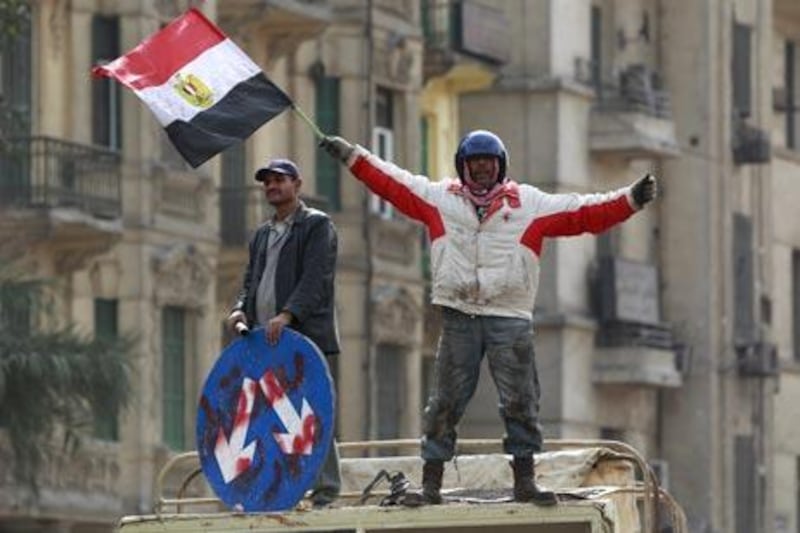Conflicting reports were coming out of Cairo today over whether opposition groups will talk to the Egyptian government to find an end to the country's current crisis before or after President Hosni Mbarak steps down.
According to the news agency Bloomberg, an Egyptian opposition coalition led by El Wafd party, the country's oldest political party, has agreed to negotiate with President Mubarak's government, Sayed Badawi, the party's head, said in a televised press conference today.
He said the talks would aim at dismissing both houses of parliament and amending three articles in the constitution concerning presidential elections, among other demands.
However, on the 10th day of a popular uprising, the opposition National Coalition for Change rejected any talks with the regime before Mr Mubarak goes, its spokesman Mohammed Abul Ghar told AFP.
Meanwhile thousands of anti-regime protesters stood their ground today after Egypt's revolt turned into a deadly battle for a central Cairo square.
State television said that Vice President Omar Suleiman had opened a dialogue with "political parties and national forces," although he himself has ruled out talks with the opposition until all protesters go home.
But Mr Ghar said: "Our decision is clear: no negotiations with the government before Mubarak goes. After that, we're ready for dialogue with Suleiman."
The coalition that Mr Ghar talks for includes the Nobel peace laureate Mohammed ElBaradei, members of the powerful Muslim Brotherhood, the Kefaya movement and other political parties.
__________________________
[ MORE ON THE EGYPTIAN UNREST ]
__________________________
Running battles for control of Tahrir Square, the focal point of the anti-Mubarak protests, that began on Wednesday raged through the night into today, with the health ministry giving a toll of five people killed and 836 injured in the past 24 hours.
Around 50 army troops finally moved in to create a buffer zone early on Thursday between the foes and supporters of Mubarak, but pro-regime militants later broke through the lines to hurl stones, correspondents at the scene said.
In a renewed effort to separate the two camps, army tanks pushed pro-Mubarak supporters away from the demonstration.
Undaunted by what is seen as a bid by Mr Mubarak's regime to intimidate protesters through violent attacks, tens of thousands of protesters have said they will go ahead with plans for a massive demonstration on Friday, their designated "departure day" for the 82-year-old president.
As EU nations urged an immediate political transition to end the bloodshed and urged Cairo to bring the perpetrators of violence to justice, The prime minister, Ahmed Shafiq promised that the clashes would be investigated.
Dr Mohammed Ismail, at a makeshift clinic in another square next to Tahrir, said gunmen during the night killed at least four anti-Mubarak protesters, with the shots allegedly fired by plainclothes police loyal to the regime.
The night battles came after backers of Mr Mubarak stormed Tahrir Square stronghold of anti-regime protesters, on Wednesday afternoon sparking the fighting.
________________________________________
[ PICTURES, AUDIO and VIDEO reports from Cairo ]
________________________________________
The two sides fought battles with stones and Molotov cocktails through the night and into Thursday, with many of the square's paving slabs torn up and broken into fist-sized projectiles.
With tensions remaining high, 30 regime supporters reappeared on 6 October Bridge today, allowing them to rain rocks and petrol bombs down on the anti-Mubarak protesters, the AFP correspondent said.
A Mubarak supporter wearing a red jumper bridge looking at the protesting crowd below repeatedly drew a finger across his throat.
Washington, which has repeatedly called for restraint, condemned the violence against "peaceful protesters" while the UN chief, Ban Ki-moon, said the attacks on demonstrators were "unacceptable."
The US president, Barack Obama, has called for the transition from Mr Mubarak's rule to begin immediately after the veteran president announced late on Tuesday that he would not seek re-election in September after naming named a vice president.
But the Egyptian foreign ministry said such calls "sought to inflame the internal situation."
On the economic front, a whopping US$49 billion has been wiped off the value of shares on Arab stock markets since the protests in Egypt began, the Kuwaiti asset manager KAMCO said in a report.
The US State Department issued a stark travel warning for citizens in Egypt, urging those who want to leave to "immediately" head for the airport, adding that any delay was "not advisable."
As the situation in Egypt deteriorated, up to 600 employees of United Nations agencies and their families were to be airlifted to Cyprus today, with only essential staff staying in place, a UN spokesman said.
After thousands spent a chilly night, sleeping, chanting, throwing stones and nursing wounds, protesters have erected corrugated iron and rubbish barricades on streets leading into the square.
Soldiers deployed around the square had retreated into their tanks and armoured personnel carriers, after a hail of rocks rained down on them for hours on Wednesday.
From early Wednesday afternoon until well into the night, regime supporters and opponents threw stones and battled with sticks and fists in Tahrir Square, the centre of protests that have sent shockwaves around the Arab world.
Anti-regime protesters stopped handing over pro-Mubarak militants to the army as they said they were just being released. Instead, they kept some 30 of those they captured at an improvised prison in a metro station.
The captives were badly beaten, an AFP correspondent reported.
Several foreign journalists have also became the target of violent attacks, a media watchdog and news organisations said, apparently on charges of fuelling the uprising with their coverage.
As many as 300 people may have been killed in Egypt's anti-government unrest which erupted on January 25, the UN High Commissioner for Human Rights, Navi Pillay ,said on Tuesday.
Security and medical sources in Egypt said on Monday at least 102 people had been killed in clashes between demonstrators and police before policemen were ordered to stand down last weekend.





